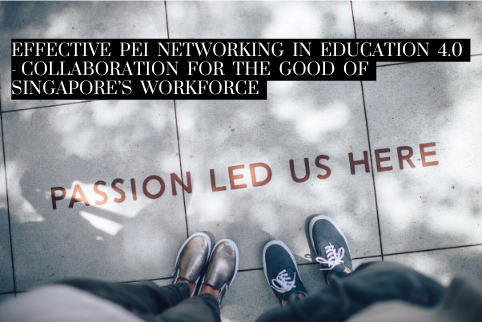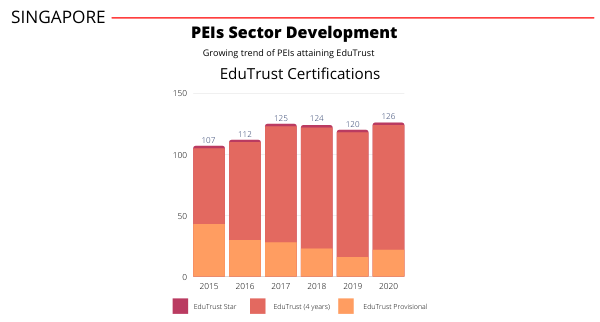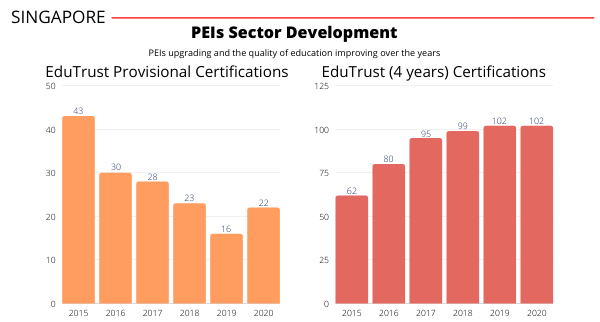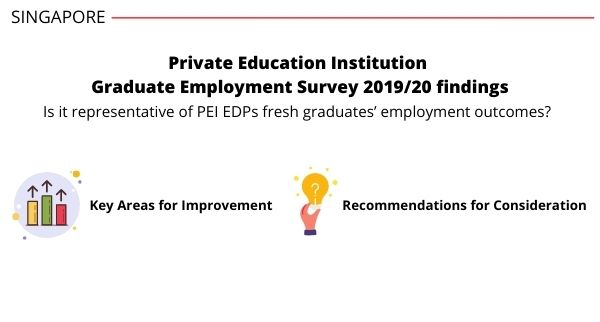Singapore Private Education Sector Need Stronger Sectoral Network
The Private Education Sector in Singapore has had its ups and downs over the years; in fact, since the implementation of The Private Education Act (2009), the number of Private Education Institutions (PEIs) has decreased from a high of 1200 in 2007 (1) to 309 as of March 11, 2022 (2), as the government pushed to better regulate the sector’s quality standards. In order to promote quality assurance standards, the EduTrust-Certification scheme was also introduced to encourage better running of PEIs.
The Association of Private Schools (APSC) was founded in 1987 to promote greater co-operation and information sharing among Private Education providers, and later the Singapore Association for Private Education (SAPE) was formed in July 2012 to respond by banding together to form a supportive network with the goal of improving the quality and competency of their teaching and learning services as well as operational excellence (3).
Despite SAPE’s recruitment efforts, not all PEIs are members, and PEIs have largely served as silos in a highly competitive market for both domestic and international students. The market for PEIs has shrunk as a result of more education options from Singapore government-run institutions and training centers, as well as various student visa requirements. The Covid-19 pandemic has exacerbated PEI’s survival and sustainability concerns. Singapore’s education system will change in the coming years to meet the needs of the future of learning. Education Minister Chan Chun Sing stated on February 10, 2022, that the educational system must pay attention to those who have already graduated and retrain approximately half a million adult learners each year, laying out his vision for universities’ role in meeting future needs (4). These trends will affect the sustainability of PEIs in Singapore. The question remains as to how PEIs will work together to address all of these pressing issues. Can improved sectoral collaborations, selfless sharing, and alliances help to make the sector more appealing to students and government funding? Should a more neutral organization not championed and led by the PEI Industry itself be the answer to better sector collaborations?
Building a World-Class PEI Sector in Singapore to Contribute to Singapore’s Future Workforce
The private education sector has traditionally served as an alternative education and training option for Singapore students who have missed out on their education qualifications due to various circumstances. The private education sector does provide a variety of unique experiences that can be extremely beneficial, as well as fostering an environment that unquestionably assists students in becoming productive members of Singapore’s workforce.
Regrettably, in comparison to Singapore’s well-run and well-funded public education system, PEIs as alternative education and training institutions are frequently viewed as second-class. PEIs will be required to contribute to the development of high-quality inputs and outputs in a collaborative ecosystem that has the potential to improve the sector’s quality prospects. PEIs must collaborate as a sector to expand on what is already being done well.
Timely for Quality Collaboration and Networking for Singapore PEIs Driven by an Independent Committee
According to a report by Skillsfuture in 2020 (5), Singapore’s private education sector is worth approximately S$3 billion, with an average of 120,000 private school students enrolled in PEIs each year since 2009, and approximately 58,000 international students holding a student pass in 2021(6). The market valuation is sufficient to justify PEIs taking a more proactive stance toward sectoral value positioning and reputations. According to a review of the industry, there is very little sectoral quality networking to improve the value proposition of PEI contributions and establish the sector as a force to be reckoned with for knowledge and skills qualifications that can match what public institutions are doing.
A network of organizations can be defined as a collection of relationships that serve as a context for the interactions of an organization with other individuals and businesses (7). Additionally, research indicates a positive correlation between organizational networks and strategic business performance (7) (8), there are numerous advantages:
- Ability to promote detachment from rigid hierarchies
- Improved decision making
- Low-cost learning opportunities
- Shared access to the resources
- Increased organizational flexibility to utilize and repurpose resources
- Increased capacity to adapt to anticipated or unanticipated change
- Access to new knowledge for the business
- Improve its risk management capabilities
Networking fosters an environment of democratic communication, process flexibility, and cross-organizational collaboration, all of which contribute to the development of an innovative culture that has a significant impact on organizational outcomes (8). Due to the fact that PEIs are frequently located near their markets, a well-positioned, reputable sectoral brand will establish a unique position for gaining easy access to market information and thus making informed decisions(9). Many PEIs are small-medium enterprises, owner-managers can instead effectively establish market positioning by associating with a high-quality networking organization and leveraging through partnerships with other stakeholders.
EV Network – A New Private Education Network for Quality Private Education in Singapore
EV Network, supported and funded by EduValue, is a free membership network to fulfil the gap of an independent network with the aim to bring up the standing of the PEI sector in Singapore. “EV Network is an independent networking organization that will champion and encourage members to build an environment of open-sharing, value-creating and co-creating which will drive the development of best practices” said Barry, Founder of EduValue.
The EV Network aims to:
- Champion industry benchmarking and sharing of best practices
- Address collectively to deal with market uncertainty through effectual networking
- Create a shared services to lower the cost of research into learners’ needs
- Contribute and participate actively towards national workforce agenda
- Drive the value creation of Singapore education value chain
Conclusion
In business, networking is one of the most effective tools for advancing an organization’s professional standing. A strong PEI business network demonstrated solidarity and a united sector capable of advancing agendas, creating value, and enhancing the overall Private Education Sector’s market position. It is timely that EV Network is established with the goal of empowering PEIs and strengthening them collectively in order to make a lasting difference in private education in Singapore and contribute to the country’s workforce’s future.
References
1 Sandra Davie (2009). Stringent laws to govern private schools, The Straits Times,
https://www.asiaone.com/News/Education/Story/A1Story20090916-168144.htm
2 Training Partners Gateway (2022), Permitted Courses Offered by PEIs,
3 Singapore Association for Private Education (2022),
4 Amelia Teng (FEB 10, 2022). Education system must gear up to retrain half a million adult Singaporean learners yearly: Chan Chun Sing, The Straits Times,
5 SkillsFuture.SG (2021). 2020 Private Education Sector View report
6 Cheryl Lin (28 Sep 2021). Singapore’s population shrinks to 5.45 million; citizens and PRs dip for first time since 1970, CAN,
https://www.channelnewsasia.com/singapore/spf-scams-236-people-under-investigation-2556751
7 Yousaf, Z. and Majid, A. (2018), “Organizational network and strategic business performance: does organizational flexibility and entrepreneurial orientation really matter?”, Journal of Organizational Change Management, Vol. 31No. 2, pp. 268-285,
https://doi.org/10.1108/JOCM-12-2016-0298
8 Sumin Han (2020). Relative Managerial Networking and Performance: The Moderating Role of Environmental Context, Public Administration Review (81)(2) pp. 205–219, The American Society for Public Administration., DOI: 10.1111/puar.1316,
https://onlinelibrary.wiley.com/doi/full/10.1111/puar.13164
9 Elin Kubberød, Viktorija Viciunaite and Siw M. Fosstenløkken (2019). The role of effectual networking in small business marketing, Journal of Small Business and Enterprise Development (26)(5) 2019, pp. 747-763,
https://www.emeraldinsight.com/1462-6004.htm
Written By Alan Go, Lead Research, EV Academy





